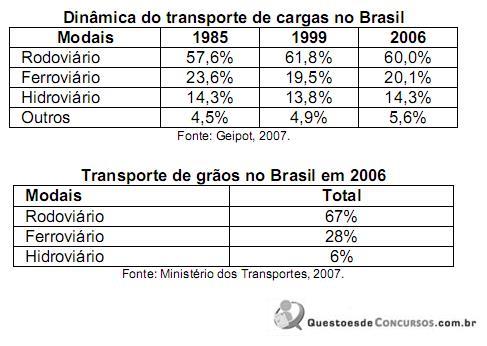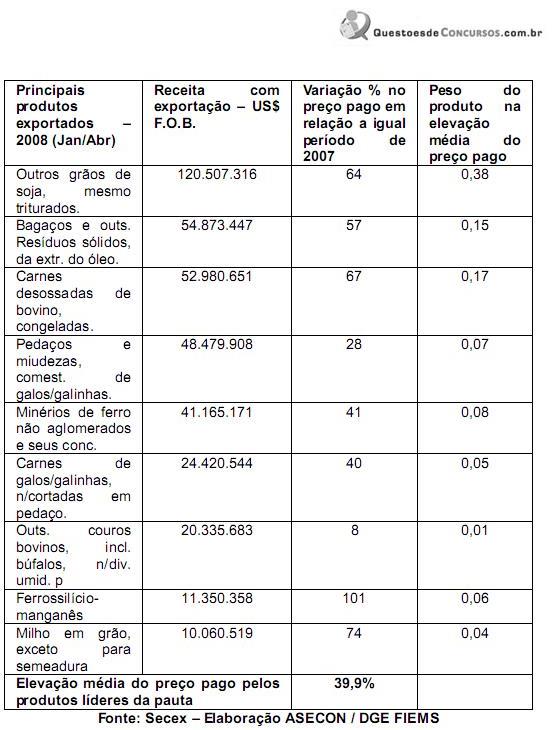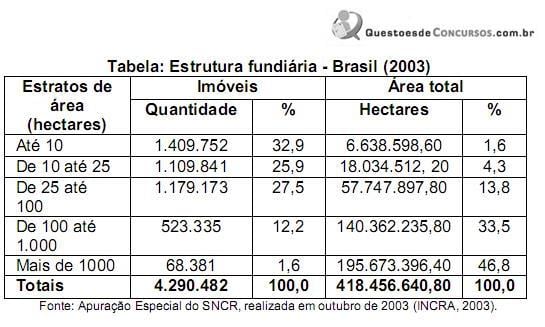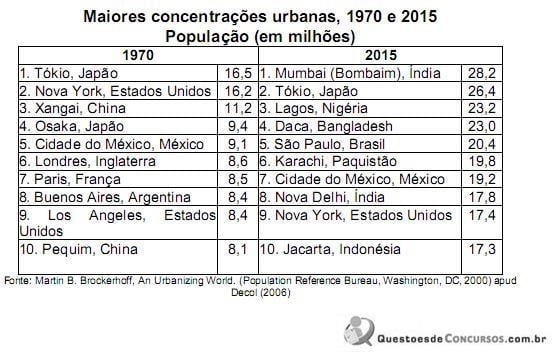Questões de Vestibular UFGD 2010 para Vestibular, Prova 1
Foram encontradas 80 questões

Tendo em vista essas informações e as características da infraestrutura de circulação do Brasil, pode-se afirmar que

Com base nessas informações, assinale a alternativa correta.
OCDE: EMERGENTES TERÃO 60% DO PIB MUNDIAL ATÉ 2030
Relatório da organização mostra uma transformação da riqueza global que vem acontecendo nos últimos 20 anos.
Paris - Em 2030, quase 60% do Produto Interno Bruto (PIB) do mundo estará concentrado nos países em desenvolvimento, como resultado de uma "transformação estrutural de importância histórica" na economia mundial, afirmou a Organização para a Cooperação e o Desenvolvimento Econômicos (OCDE) em um relatório divulgado nesta quarta-feira.
Em 2000, os países que não integram a OCDE (atualmente formada por 34 países) representavam 40% da produção mundial, mas em 2030 concentrarão 57%, segundo o estudo, intitulado "Perspectivas sobre o desenvolvimento mundial 2010: riqueza em transformação".
O informe assinala que "o rápido crescimento das economias emergentes levou a uma reacomodação do poder econômico" e deu lugar a uma "nova geografia do crescimento mundial" e indica que "a crise financeira e econômica acelerou esta transformação estrutura da economia".
"As previsões sugerem que os países em desenvolvimento e os emergentes representarão quase 60% do PIB mundial em 2030", afirma a primeira edição deste informe anual.
Exemplo dessa "transformação estrutural" que foi acontecendo nos últimos 20 anos é o caso da China, enfatiza a OCDE, país que, em 2009, se converteu no principal sócio comercial do Brasil, Índia e África do Sul.
"O centro de gravidade econômico do planeta se deslocou para o Oriente e o Sul; de membros da OCDE a economias emergentes", afirma o documento, que classifica o fenômeno de "riqueza em transformação".
Disponível em . Acesso em 16 Nov. 2010
[Texto adaptado]
Considerando as informações trazidas pelo texto e as transformações ocorridas nos últimos anos no quadro da economia mundial, assinale a alternativa correta.

Com base nessas informações e considerando as características da economia desse Estado, assinale a alternativa correta.


Considerando essas informações, assinale a alternativa correta.

Com base nessas informações, assinale a alternativa correta.
"O Panelaço na Argentina" trata de um acontecimento do ano de 2001. Retrata um pouco da crise econômica Argentina, país que espoliou a maioria dos seus habitantes, confiscando-lhes a poupança; o governo preferiu dar prioridade aos credores do FMI em detrimento da população argentina. Com isso, várias pessoas saíram às ruas para reclamar e até forçar a renúncia do presidente Menem. Nesse momento são as mulheres, inclusive as representantes das "Mães da Praça de Maio", que elaboram uma crítica veemente com relação ao neoliberalismo. Elas participaram desse "panelaço" e também do Fórum Social Mundial no mesmo ano, mostrando com isso que estão atentas à realidade que lhes rodeia, expressando sua insatisfação frente ao que acontece no mundo diante das políticas de globalização.
OLIVEIRA NETO, Augusto A.; FELIX, Keile S. L. A atuação feminina frente à politica econômica na América Latina - últimas décadas do século XX. Disponível em: . Acesso em: 05 nov. 2010. (Texto adaptado).
Tomando o texto acima como ilustração do referido período histórico, assinale a alternativa correta.
"O corpo está no centro de toda relação de poder. Mas o corpo das mulheres é o centro, de maneira imediata e específica. Sua aparência, sua beleza, suas formas, suas roupas, seus gestos, sua maneira de andar, de olhar, de falar e de rir (provocante, o riso não cai bem às mulheres, prefere-se que elas fiquem com as lágrimas) soa o objeto de uma perpétua suspeita. Suspeita que visa o seu sexo, vulcão da terra. Enclausurá-las seria a melhor solução: em um pesco fechado e controlado, ou no mínimo sob um véu que mascara sua chama incendiária. Toda a mulher em liberdade é um perigo e, ao mesmo tempo, está em perigo, um legitimando o outro. Se algo de mal lhe acontece, ela está recebendo apenas aquilo que merece."
PERROT, Michele. As mulheres ou os silêncios da história. Bauru: EDUSC, 2005. p. 447.
Michele Perrot faz referência à descrição das normas de controle impostas às mulheres na Idade Média. Em relação às mulheres europeias no período medieval, assinale a alternativa correta.
"De 1964 até o final dos anos 70, grandes mudanças políticas se processaram na América Latina. Em março de 1964, os militares derrubaram o poder constitucional de João Goulart, no Brasil, dando início a uma série de ditaduras militares, que iriam espalhar-se por toda a América Latina"
(CÁCERES, Florival. História da América. São Paulo: Moderna, 1992 p. 208).
Com relação à implantação das ditaduras militares na América Latina, no período aludido, assinale a alternativa correta.
As Brazil's charismatic President Luiz Inacio Lula da Silva makes a triumphant exit, having fostered a fast-growing economy that lifted millions out of poverty and pleased financial markets, his country seems more than ever to embody the word "progress" that is emblazoned across its national flag. But as the Oct. 31 run-off election to choose his successor approaches, the focus is shifting to one aspect of Brazilian society where many say there has been little progress: Abortion is still illegal, despite one in five Brazilian women undergoing the procedure in their lifetimes.
With religious-right votes up for grabs in the upcoming poll, the two remaining candidates and the leading party are backing down from earlier abortion-rights endorsements, leading abortion-rights advocates to say that votes are being traded for women's health. Two-thirds of Brazil's 191 million people are Roman Catholics, making it the world's largest Catholic nation. But the number of those professing evangelical beliefs, some 17 percent of the population, is growing fast.
The frenzy to collect more of those votes is causing Lula's left-wing Workers Party to mull whether to back off its commitment to see abortion rights debated in Congress, and the party's candidate, Dilma Rousseff, heavily favored to win, is distancing herself from abortion-rights comments she made before becoming a candidate.
"It will be really ugly if the Workers Party pulls abortion rights from its agenda," said Regina Soares, a spokeswoman for the abortion-rights group Catholics for the Right to Decide. "[Abortion] is a problem of a huge size, which has same importance as unemployment and homelessness," she said. Abortion is illegal in Brazil except in the case of rape or if the mother's life is in danger. Yet one in five Brazilian women under age 40 has had an abortion, the vast majority illegally. Half of those women end up in the hospital as the result of complications, said Marcelo Medeiros, an economist and sociologist who coordinated a 2009 government-funded abortion study. The abortion question shifted to the fore after Sunday's first-round presidential elections, in which Rousseff was expected to sail easily past the 50 percent mark that would have made a second round unnecessary. But she received 46.8 percent, forcing a runoff with centrist challenger Jose Serra at the end of the month. Support for the 62-year- old former guerrilla, Lula's chosen successor, eroded in part because the religious right aired ads portraying Rousseff as pro-abortion-rights, observers said. To shore up votes, the Workers Party is considering whether to yank its promise to see abortion rights debated in Congress. In his more recent position as Brazil's health minister, Serra, along with the Workers Party, has advocated for a debate on abortion in Congress in the name of public health. But during his campaign, Serra declared himself anti-abortion. Observers are split on whether the issue could prevent a Rousseff win. Alberto Almeida, director of market research group Instituto Analise, said voters don't see the difference between the abortion stances of Serra and Rousseff. "Abortion won't have a big role in the election because nobody has a clear position on abortion," Almeida said. But a Workers Party senator from Parana state said some of her party members could end up promoting legalized abortion, a position that could "cost the presidency," said Gleisi Hoffman, according to a Folha report. "While most Brazilians support abortion in special cases, the rest is "a gray area," Medeiros said.
Adapted from:
KELLER, Karen. Abortion Becomes Issue in Brazil's Presidential Runoff. Disponível em: http://www.aolnews.com/world/article/abortion-becomes-an- issue-in-brazils-presidential-runoff/19665625. Acesso em: 4 nov. 2010.
As Brazil's charismatic President Luiz Inacio Lula da Silva makes a triumphant exit, having fostered a fast-growing economy that lifted millions out of poverty and pleased financial markets, his country seems more than ever to embody the word "progress" that is emblazoned across its national flag. But as the Oct. 31 run-off election to choose his successor approaches, the focus is shifting to one aspect of Brazilian society where many say there has been little progress: Abortion is still illegal, despite one in five Brazilian women undergoing the procedure in their lifetimes.
With religious-right votes up for grabs in the upcoming poll, the two remaining candidates and the leading party are backing down from earlier abortion-rights endorsements, leading abortion-rights advocates to say that votes are being traded for women's health. Two-thirds of Brazil's 191 million people are Roman Catholics, making it the world's largest Catholic nation. But the number of those professing evangelical beliefs, some 17 percent of the population, is growing fast.
The frenzy to collect more of those votes is causing Lula's left-wing Workers Party to mull whether to back off its commitment to see abortion rights debated in Congress, and the party's candidate, Dilma Rousseff, heavily favored to win, is distancing herself from abortion-rights comments she made before becoming a candidate.
"It will be really ugly if the Workers Party pulls abortion rights from its agenda," said Regina Soares, a spokeswoman for the abortion-rights group Catholics for the Right to Decide. "[Abortion] is a problem of a huge size, which has same importance as unemployment and homelessness," she said. Abortion is illegal in Brazil except in the case of rape or if the mother's life is in danger. Yet one in five Brazilian women under age 40 has had an abortion, the vast majority illegally. Half of those women end up in the hospital as the result of complications, said Marcelo Medeiros, an economist and sociologist who coordinated a 2009 government-funded abortion study. The abortion question shifted to the fore after Sunday's first-round presidential elections, in which Rousseff was expected to sail easily past the 50 percent mark that would have made a second round unnecessary. But she received 46.8 percent, forcing a runoff with centrist challenger Jose Serra at the end of the month. Support for the 62-year- old former guerrilla, Lula's chosen successor, eroded in part because the religious right aired ads portraying Rousseff as pro-abortion-rights, observers said. To shore up votes, the Workers Party is considering whether to yank its promise to see abortion rights debated in Congress. In his more recent position as Brazil's health minister, Serra, along with the Workers Party, has advocated for a debate on abortion in Congress in the name of public health. But during his campaign, Serra declared himself anti-abortion. Observers are split on whether the issue could prevent a Rousseff win. Alberto Almeida, director of market research group Instituto Analise, said voters don't see the difference between the abortion stances of Serra and Rousseff. "Abortion won't have a big role in the election because nobody has a clear position on abortion," Almeida said. But a Workers Party senator from Parana state said some of her party members could end up promoting legalized abortion, a position that could "cost the presidency," said Gleisi Hoffman, according to a Folha report. "While most Brazilians support abortion in special cases, the rest is "a gray area," Medeiros said.
Adapted from:
KELLER, Karen. Abortion Becomes Issue in Brazil's Presidential Runoff. Disponível em: http://www.aolnews.com/world/article/abortion-becomes-an- issue-in-brazils-presidential-runoff/19665625. Acesso em: 4 nov. 2010.
